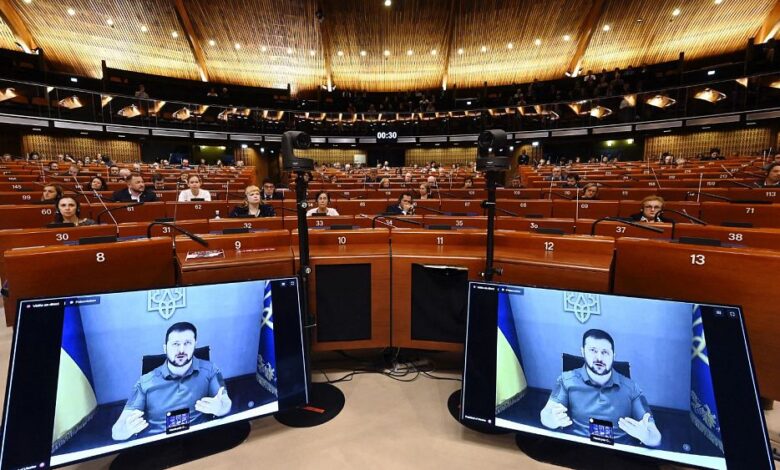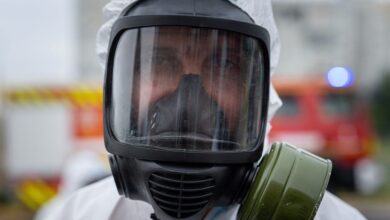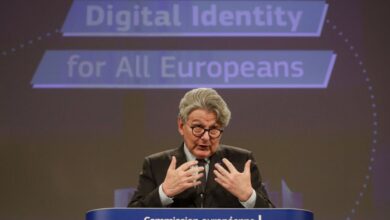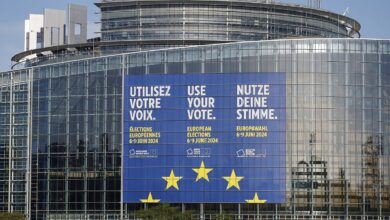War, energy crisis and inflation: The EU’s top 5 stories of the year

2022 will go down as one of the most challenging years in the EU’s history as the bloc grappled with Russia’s invasion of Ukraine and its humanitarian and financial consequences.
These include a deep energy crisis and record inflation.
Here’s a breakdown of the biggest stories in the EU this year.
Russia’s invasion of Ukraine
The EU was quick to condemn Russia’s full-scale invasion of Ukraine, which began on February 24 after months of concern about the gathering of tens of thousands of Russian troops on the country’s border.
Since then, the EU has repeatedly demanded that Russia cease its military actions in Ukraine and withdraw all forces from its territory, calling the invasion “unprovoked” and “unjustified”.
The bloc has so far rolled out nine packages of sanctions aimed at derailing Moscow’s ability to fund the war. They target Russia’s banks and exports of seaborne oil, coal, steel, and wood and prohibit exports from the EU of any material, such as technology, that can be used by the military.
The list of Russian individuals and entities under sanctions has meanwhile grown to over 1,500 and includes President Vladimir Putin, Foreign Affairs Minister Sergey Lavrov, high-ranking officials, oligarchs and propagandists.
The bloc has also sent numerous humanitarian and military aid packages to Ukraine.
Millions of Ukrainians, mostly women and children, who fled the war and sought safety in Europe were granted the right to work and go to school.
The EU is also financing the purchase and delivery of weapons to Ukraine and has so far spent a collective €3.1 billion through the European Peace Facility (EPC) to that effect. This is on top of the bilateral military assistance some EU countries have also provided Ukraine.
The bloc launched a ‘European Union Military Assistance Mission’ for Ukraine with the aim of training at least 15,000 Ukrainian troops on EU soil over the next two years as well.
Macro-financial assistance was provided to the war-torn country over the course of the year.
Kyiv received 3 billion from the EU to cover its budget deficit and keep its economy running — well below the initial €9 billion announced by European Commission chief Ursula von der Leyen.
The well-publicised failure to send the promised fund led to weeks of intense negotiations among EU countries culminating in a commitment to send €18 billion in assistance throughout 2023.
But one of the most powerful signals of the EU’s support was provided in late June when leaders granted Ukraine and Moldova candidate status.
Russia’s war in Ukraine has also led the EU to reconsider its own defence and energy systems, with the goal of making them less vulnerable to a potential external attack or another situation like Russia’s invasion.
The energy crisis
The EU’s dependency on Russian fossil fuels proved costly.
In response to the war in Ukraine, the bloc vowed to quickly wean itself off Russian energy supplies. And although it did not impose sanctions on gas — Russia supplied around 40 per cent of the bloc’s natural gas in 2021, according to the European Commission — it found itself scrambling to find alternative supplies when Moscow switched the Nord Stream 1 pipeline off to retaliate against sanctions.
Fatih Birol, Managing Director of the International Energy Agency, said “Europe is at the epicentre” of the “first truly global energy crisis” because of its dependence on Russian energy.
“Our world has never, ever witnessed an energy crisis with this depth and with this complexity,” he said in an interview with Euronews.
To ensure it would have adequate supplies throughout winter, the EU put in place an energy-saving plan, struck deals with so-called trusted and reliable partners to replace Russian fossil fuel, and agreed to create a joint purchasing platform for gas in a bid to lower prices.
The European Commission also came out with an action plan called REPowerEU to end its dependency on Russian fossil fuels by 2027 and speed up the energy transition the bloc has vowed to pursue to fight the climate crisis.
An agreement on the plan was struck on December 13 allowing EU countries to tap into €225 billion of unspent money initially earmarked to help the bloc’s economies rebound from their COVID slump to speed up the energy transition and diversify energy supplies away from Russia.
On the other hand, the bloc struggled to put in place price caps on oil and gas. But after weeks of political bickering, a deal was finally struck on December 19 for the first-ever cap on gas prices.
Inflation
After two years of pandemic-related disruption, 2022 has seen inflation rising across the globe — but Europe has been particularly affected, putting the bloc’s citizens under significant financial strain.
In the Eurozone, annual inflation climbed to a record high of 10.7 per cent in October, fuelled by the energy crisis exacerbated by Russia’s war in Ukraine and higher food costs resulting from the impact of the conflict on Ukraine, a world’s major food exporter.
In countries particularly vulnerable to fluctuation in energy markets, like Estonia and Lithuania, annual inflation soared above the 20 per cent mark.
The price of natural gas for household consumers in these countries surged by over 100 per cent between the first half of 2021 and the first six months of 2022.
These numbers are much higher than the European Central Bank’s (ECB) goal of keeping annual inflation in the Eurozone “close but below” the 2 per cent mark. In an attempt at bringing down inflation, the ECB broke with over a decade of unchanged interest rates and operated multiple hikes between September and December.
Although inflation abated in November, ECB President Christine Lagarde has warned that it may not have peaked in the eurozone yet.
Rule of law
In a move that was unprecedented in the history of the EU, the European Commission triggered a new conditionality mechanism against Hungary.
The EU’s executive demanded that €7.5 billion in EU funds to the country be frozen until a set of reforms to address rule of law concerns over judicial independence, corruption and conflicts of interest is passed.
Budapest had until November 19 to pass 17 reforms negotiated with the EU’s executive over the summer in order to avoid the freeze threatened by Brussels.
The Commission assessment was that “while a number of reforms have been undertaken or are underway, Hungary failed to adequately implement central aspects of the necessary 17 remedial measures…as it had committed to” and referred the matter to EU capitals for a vote.
Still, Hungary managed to negotiate a reduction of the EU funds frozen to €6.3 billion by lifting vetoes on a couple of files that required unity: more assistance to Ukraine and the rollout of a global minimum corporate tax.
Budapest now has two years to implement the necessary reforms to unblock the funds.
Parliamentary scandal
Brussels was in December rocked by a corruption scandal within the European Parliament, the only bloc’s body whose members are directly elected by the public.
On December 9, Belgian police arrested European Parliament’s Vice President Eva Kaili and five other people following a “major investigation” into corruption, money laundering and criminal organisation.
Four — including Kaili — were charged and imprisoned in Belgium under the accusation of having allegedly received “substantial” money payments by a Persian Gulf state, widely believed to be Qatar.
The Qatari government denies involvement and the Belgian prosecutor’s office would not confirm the country’s name.
The EU has taken a strong stance against those accused of being involved in the corruption scandal, with European Parliament’s President Roberta Metsola saying that the parliament “stands firmly against corruption” and that there would be “no impunity.”
The scandal has brought condemnation from MEPs and EU leaders.
Get Best News and Web Services here







